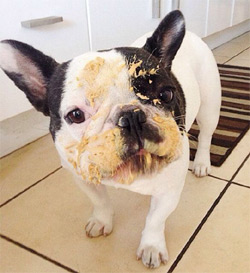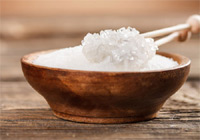Peanut Butter & Dogs - Xylitol Warning
Xylitol can be fatal to dogs and is increasingly found in many human foods. In this article I want to look specifically at the recent peanut butter warning.
 I read a post on Facebook today by Vet Healthcare in the USA that read as follows:
I read a post on Facebook today by Vet Healthcare in the USA that read as follows:
ATTENTION: It has been brought to our attention in recent veterinary articles that several brands of peanut butter and other nut butters are beginning to substitute sugar with a sweetener called Xylitol. Xylitol is extremely toxic to dogs in very small doses. Ingestion can cause rapid hypoglycemia (a dangerous drop in blood sugar level) and can cause extensive damage to liver cells, both conditions are potentially fatal. Please check your peanut butter labels for Xylitol, if it is on the ingredients list ensure your dog does not consume the product.
Pretty scary stuff. I shared (of course) and hoped it would be obvious for dog owners to spot Xylitol on the ingredients list of food labels. Then I started to wonder how many brands of peanut butter are actually affected and would it be obvious which ones to avoid?
Let's look more closely at this information, as it is very important.
Xylitol is dangerous to dogs
Firstly, Xylitol is indeed incredibly dangerous to dogs. It triggers a sudden release of insulin, causing a dramatic drop in blood sugar which can lead to liver damage.
Wikipedia states: Xylitol is well established as a life-threatening toxin to dogs. According to the ASPCA Animal Poison Control Center, the number of cases of xylitol toxicosis in dogs has significantly increased since the first reports in 2002.
Xylitol is everywhere
 Xylitol is becoming increasingly difficult to avoid. It has no ill effects for humans and contains about a third less calories than standard 'table' sugar. As you can imagine, it is a popular sweetener used in many human food products, especially sugar free foods, sweets and cakes.
Xylitol is becoming increasingly difficult to avoid. It has no ill effects for humans and contains about a third less calories than standard 'table' sugar. As you can imagine, it is a popular sweetener used in many human food products, especially sugar free foods, sweets and cakes.
Peanut butter
So, back to peanut butter. Today, 19th June 2015, I checked out some peanut butter brands and UK high street brands by looking at the ingredients information available online. I struggled to find a brand that obviously contained Xylitol. In fact the only one I came across that did contain the sweetener was Dr. John's® Sugar Free Simply Xylitol® which is so clearly labelled you could not really miss it.
Now that's not to say other peanut butters containing Xyliotol don't exist. The conclusion remains - read the label. In particular, look for any brand that says it is sugar free. That often means they have replaced the sugar with a sugar substitute.
By the way, did you know that KONG make an all natural dog friendly peanut butter in a handy pouch with easy to use sealing lid to keep it fresh and ready for the next use.
Spotting Xylitol on a food label
I started to wonder if, even when reading food labels, would the presence of Xylitol be obvious? What exactly is Xylitol and could it go by other names?
Xylitol is a sugar alcohol (alditol) and an 'all-natural' alternative to sugar.
According to the BBC Good Food website in an article called Sugar substitutes - xylitol explained:
"Xylitol is a naturally present substance found in the fibres of many fruits and vegetables and can be made in small amounts by the body. While it can be sourced from carbohydrate molecules (called polysaccharides) in the cell walls of birch and beech trees, rice, oat, wheat and cotton husks, the main source of Xylitol for commercial use is corn cobs. Once extracted and processed, you're left with a white, crystalline powder that looks like sugar."
So maybe we need to be looking out for mention of birch/beech tree, husk or corncob derived sweeteners? Yes, it seems we do.
I found another useful article on the Preventive Vet website called Is Peanut Butter Safe For Dogs?
 They mention a brand called Nuts ’N More® as containing Xylitol *. To the right you can see the label with the wording 'Natural Sweetener (Birch Xylitol)'. This month they added a second brand to the list - Krush Nutrition. I was only able to find that in the form of a protein bar, not a jar of peanut butter... but do correct my if I am wrong.
They mention a brand called Nuts ’N More® as containing Xylitol *. To the right you can see the label with the wording 'Natural Sweetener (Birch Xylitol)'. This month they added a second brand to the list - Krush Nutrition. I was only able to find that in the form of a protein bar, not a jar of peanut butter... but do correct my if I am wrong.
OK, so while this doesn't seem to be a widespread issue yet, that's not to say it won't be and this kind of information is always worth knowing.
Why this matters
I think this warning about Xylitol is still incredibly important. It never hurts to get these messages out to dog owners. Don't forget, it doesn't only apply to Peanut Butter. As discussed, Xylitol is added to many human foods, so vigilance is always best, whether it is peanut butter or another food. Be especially cautious when it comes to sugar free foods, sweets and cakes. Before feeding any human food items to your dog, please do check the labels.
If you think your dog has eaten xylitol, please don't wait to see what will happen. Contact your vet straight away.
For further information about other foods dangerous to dogs, please see Foods to Avoid Feeding to Your Dog.
* Preventive Vet reached out to the folks at Nuts 'N More® to ensure that they are aware of this danger and to ask them to help people protect their dogs by adding appropriate warnings to their packaging and website. They have said that they are willing to work with them to help ensure that this important awareness effectively reaches their customers and other dog lovers. Great news. Well done Nuts ’N More.
By Jenny Prevel
© D for Dog www.dfordog.co.uk
This article belongs strictly to D for Dog and we do not authorise the copying of all or any part of it.

Great article, obviously well researched. Well done. Shall share this & ask others to do the same.
Thanks DforDog